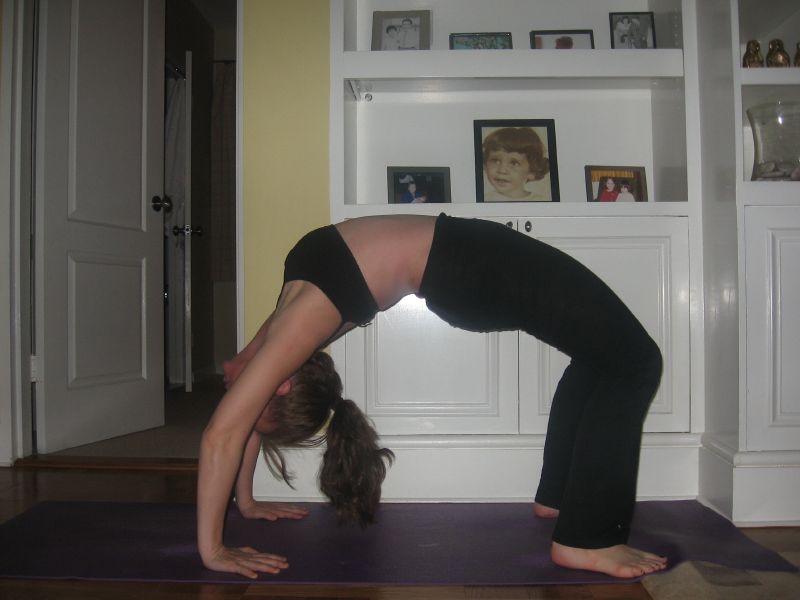Update on Anotherexia: apparently someone agrees with me...
These quotes on eating disorders that hide under the guise of acceptable yoga practices came from a February, 2005 article in The Guardian,entitled Omming on Empty (thanks to Emily for linking me to it....)
- The characteristics that create a great yoga practice - extreme sensitivity, perfectionism and wanting to be in control - are also characteristics of anorexia," says Clare, a London-based yoga teacher. "Being sensitive, you feel the nature of the postures more, so get more out of them; perfectionism makes you want to keep doing it better....
- [A]shtanga also offers routine and regularity - you are encouraged to practise five or six days a week, for an hour and a half at a time and, ideally, first thing in the morning. Rachel, a 30-year-old Londoner who suffered from eating disorders for years and took up astanga yoga as a follow-on from the gym, says, "It was completely addictive and really fed into my addictive personality, so that if I didn't practise one morning, I would be miserable the whole day...
- Then there's the whole food thing. Yoga is replete with references to being "light" and "empty", and eating at certain times in relation to the practice. It becomes an issue. One yoga teacher says, "You know you should leave two hours after eating [before exercise] and, if it is a heavy meal, four hours, so it becomes this thing of, well, when can I eat? That's quite a common thing with yoga teachers." If you are already trying to avoid eating, yoga gives you a perfect cover for it - it is virtually recommended. Mary Taylor, co-author of What Are You Hungry For? Women, Food And Spirituality, explains, "Many forms of yoga suggest if you are doing an asana [physical practice], you should wait X number of hours. It becomes a convenient excuse not to eat. Then, when you haven't eaten, you can get light-headed, which is misinterpreted as a mystical experience as opposed to low blood sugar. So it has, in a backhanded way, become part of the yoga scene."
- One woman who used to have an eating disorder testifies to this connection. "Not eating is like an addiction, because you feel nothing is going to harm you," she says. "You feel clear and blissful and completely unattached - which, of course, is also what I was trying to achieve through yoga." Not only is it validated, Taylor says, such thinking is often openly admired. "If someone is extremely thin, so that they can get into any pose, that starts being equated with being a spiritual person. They get, 'Oh, they have such a beautiful practice,' so in that way they are being rewarded by the yoga community simply because they are not eating."
- There exists, they say, a widespread myth about food that is appropriate to practising yoga. "We would see people not eat dinner the night before a practice, so they could do better back bends," Ginsburg says. "Or people would get very militant and say things like, 'I only eat raw food' or, 'Potatoes will make you stiff'." If you said you couldn't eat potatoes four hours before running, you'd come over as a bit silly, or obsessive, or both, but somehow saying it in the context of yoga makes you appear supremely connected with your body. "For some yogis, these food choices may carry a seed of truth," Ginsburg adds, "but the danger is people take them as a given, as things we all must do." She argues that dietary changes can occur naturally once you take up yoga, but that the tendency is to take food advice as edict: "When these things get imposed from the outside, that is not freedom. That is the opposite of yoga."
- "When [the] practice becomes so puritanical, it changes from something beautiful and natural into a harsh, rigid regime that is potentially very destructive."
YC








4 comments:
That is a great article.
It is so true that anorexia thrives on a lot of the same princples of a good yoga practice, especially ashtanga. Extreme dedication and perfection is required of both.
Our American yoga culture reveres the skinny yogi, it's all over the media. In Ashtanga you can not progress past some asanas if you aren't thin. What's my point?
Eh, eat food be merry.
I find that not enough food beforehand harms my practice, especially the backbends. (My mind is trying to be stimulated, but runs out of gas.) I must have gotten to the "neither too empty or too full" advice pretty early. I aim to have a reasonable serving of protein and carbs about 90 minutes to 2 hours before an intense class, or, if that doesn't happen, a small serving about a half hour before class. (This means I take it easy during warm-ups.) And then I try to get something about a half hour to an hour afterwards.
Very intersting post...thanks for sharing. I think it's a fine line in ashtanga. I think people can get obsessed with wanting that "light" feeling.
When it comes down to it you are the one who really knows when you cross the line, right. For us to sit and try to dissect other's eating disorders is silly really. Each individual is different as is each disorder. Mine was different than Tiffany's as she brings up feelings of "poor me" and mine was totally about control and perfection, some may be because of a feeling of purification of their body taken to an extreme, some because of absolute fear of fatness. But if you ask anyone engaged presently in a disorder they will deny any it, which is the underlying connecting thread I think, lies. When someone begins lying about their "fast" or their "cleanse" that's when it's a problem.
Post a Comment